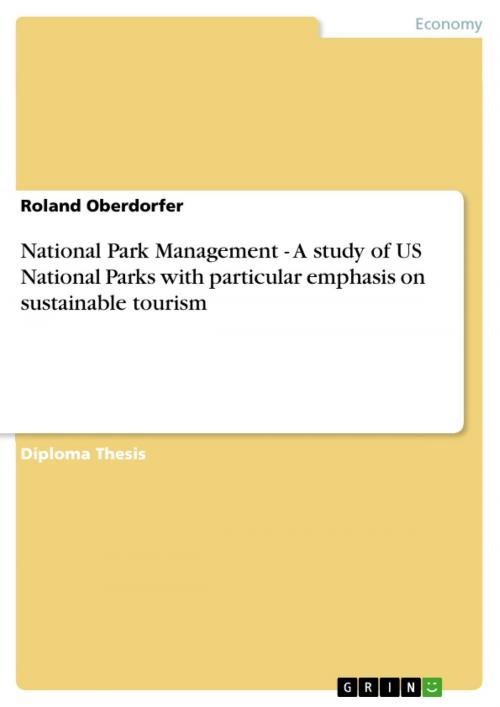National Park Management - A study of US National Parks with particular emphasis on sustainable tourism
A study of US National Parks with particular emphasis on sustainable tourism
Business & Finance, Management & Leadership, Management| Author: | Roland Oberdorfer | ISBN: | 9783638102285 |
| Publisher: | GRIN Publishing | Publication: | October 11, 2001 |
| Imprint: | GRIN Publishing | Language: | English |
| Author: | Roland Oberdorfer |
| ISBN: | 9783638102285 |
| Publisher: | GRIN Publishing |
| Publication: | October 11, 2001 |
| Imprint: | GRIN Publishing |
| Language: | English |
Diploma Thesis from the year 2001 in the subject Business economics - Business Management, Corporate Governance, grade: Good, Klagenfurt University (OPM (Organisations-, Personal- und Managemententwicklung)), 53 entries in the bibliography, language: English, abstract: 1 Introduction 'In order to sustain our global environment and improve the quality of living in our human settlements, we commit ourselves to sustainable patterns of production, consumption, transportation and settlement development, pollution prevention, respect for the carrying capacity of eco-systems, and the preservation of opportunities for future generations'(1) (Istanbul Declaration on Human Settlements, June 1996). National Parks in the United States and almost all over the world are being subjected to a paradigm shift in park conservation and management. In the early years of National Parks, conservation strategies and management actions were based on a belief that parks were static landscapes, isolated from human activities and adjacent lands, and that they were meant solely for the pleasure of visitors. Attempts to resolve system dysfunctions - wrought by erroneous views and the consequences of subsequent management policies, such as predator removal and fire suppression - were approached one species at a time. Today, this paradigm is slowly shifting to a knowledge-based understanding of ecosystems as es now recognize the need to include people as part of the system and to address causes, rather than symptoms, of system dysfunction by managing whole ecosystems, not just single species. However, National Park Management is not just limited to conservation strategies. National Park Management includes a widespread variety of management activities such as the most essential activities like park system planning, land protection, natural resource management (biological resource management, fire management, water resource management, air resource management, geologic resource management, soundscape and lightscape management), cultural resource management (e.g. archeological resources, cultural landscape, ethnographic resources, historic structures), wilderness preservation and management, interpretation and education, tourism/visitor management, and park facilities management. It is clear that in each park the emphasis of management activities should be adapted to the needs of the park, its problems and challenges. However, the next generation of park managers will need to be able to tolerate ambiguity, manage change, manage tourism patterns, set and communicate priorities, handle controversy, and understand political processes. [...]
Diploma Thesis from the year 2001 in the subject Business economics - Business Management, Corporate Governance, grade: Good, Klagenfurt University (OPM (Organisations-, Personal- und Managemententwicklung)), 53 entries in the bibliography, language: English, abstract: 1 Introduction 'In order to sustain our global environment and improve the quality of living in our human settlements, we commit ourselves to sustainable patterns of production, consumption, transportation and settlement development, pollution prevention, respect for the carrying capacity of eco-systems, and the preservation of opportunities for future generations'(1) (Istanbul Declaration on Human Settlements, June 1996). National Parks in the United States and almost all over the world are being subjected to a paradigm shift in park conservation and management. In the early years of National Parks, conservation strategies and management actions were based on a belief that parks were static landscapes, isolated from human activities and adjacent lands, and that they were meant solely for the pleasure of visitors. Attempts to resolve system dysfunctions - wrought by erroneous views and the consequences of subsequent management policies, such as predator removal and fire suppression - were approached one species at a time. Today, this paradigm is slowly shifting to a knowledge-based understanding of ecosystems as es now recognize the need to include people as part of the system and to address causes, rather than symptoms, of system dysfunction by managing whole ecosystems, not just single species. However, National Park Management is not just limited to conservation strategies. National Park Management includes a widespread variety of management activities such as the most essential activities like park system planning, land protection, natural resource management (biological resource management, fire management, water resource management, air resource management, geologic resource management, soundscape and lightscape management), cultural resource management (e.g. archeological resources, cultural landscape, ethnographic resources, historic structures), wilderness preservation and management, interpretation and education, tourism/visitor management, and park facilities management. It is clear that in each park the emphasis of management activities should be adapted to the needs of the park, its problems and challenges. However, the next generation of park managers will need to be able to tolerate ambiguity, manage change, manage tourism patterns, set and communicate priorities, handle controversy, and understand political processes. [...]















